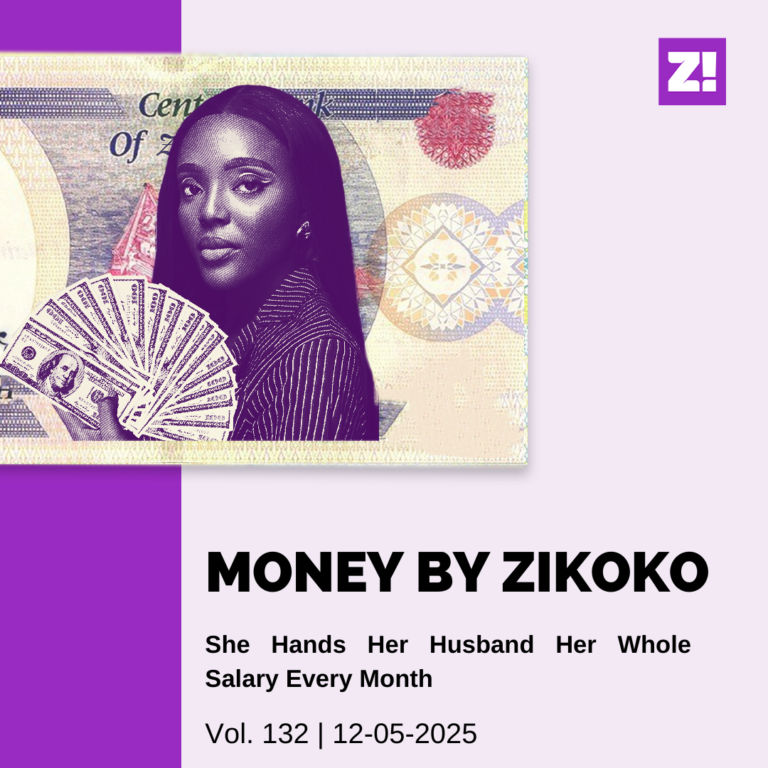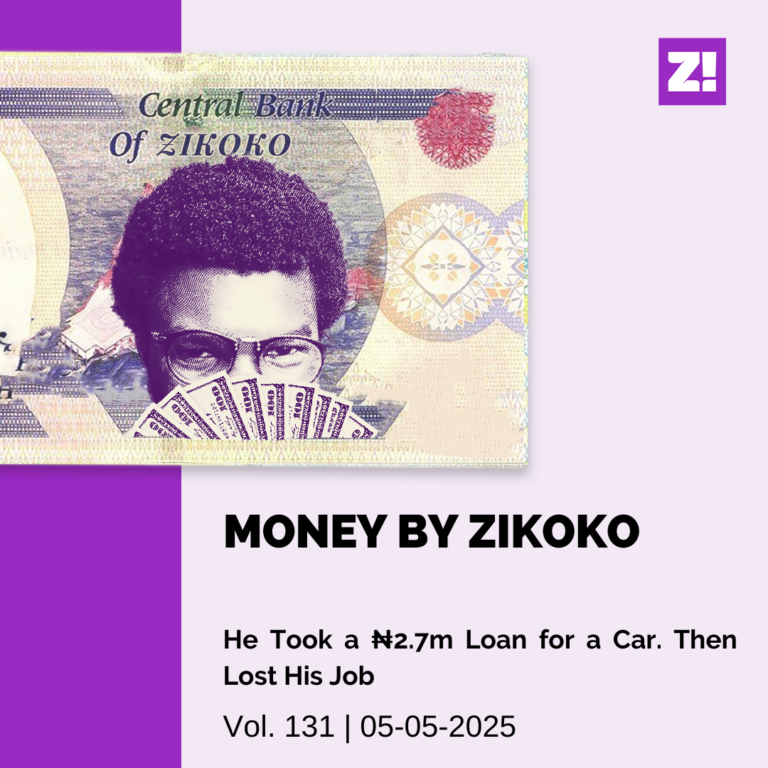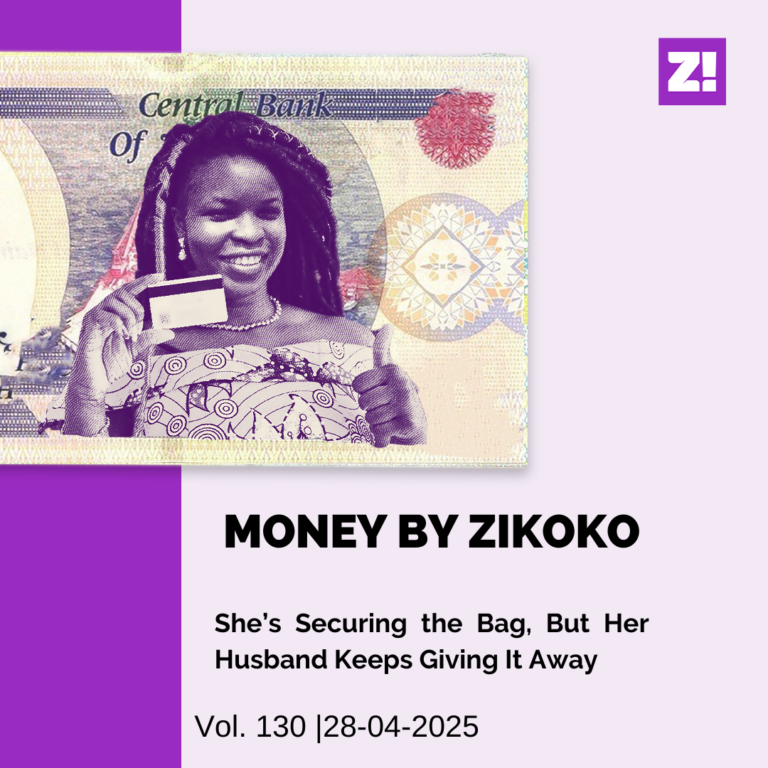Every week, Zikoko seeks to understand how people move the Naira in and out of their lives. Some stories will be struggle-ish, others will be bougie. All the time, it’ll be revealing.
This week’s Naira Life is brought to you by QuickCredit. With QuickCredit, you not only get the funds you need instantly, but you also get to pay back at the lowest interest rate in Nigeria.

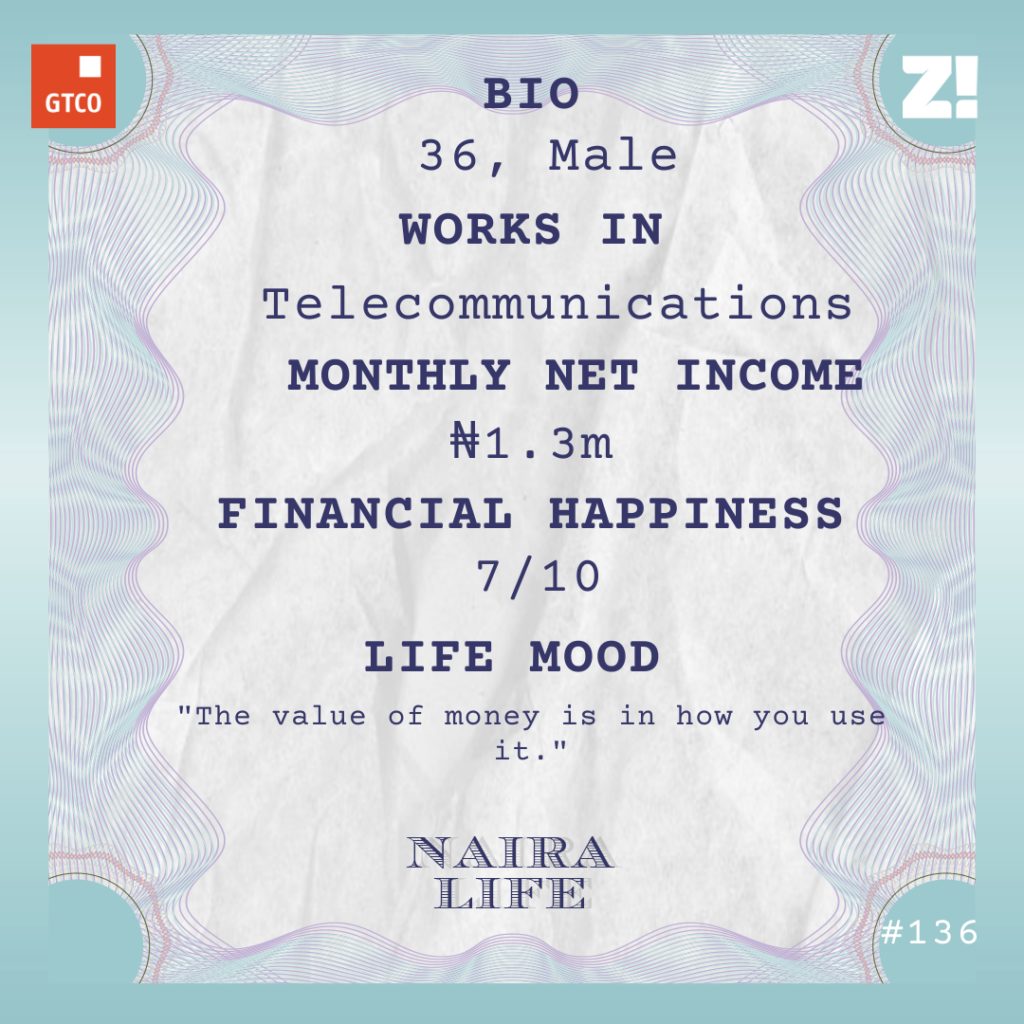
What’s your oldest memory of money?
When I was 13 years old, my dad came home with a bag. When he called me into a room and opened the bag, I saw a lot of ₦5, ₦10, and ₦20 notes inside. We counted the money together and everything was about ₦120k. This was in the mid-90s. My dad worked in a government-owned tertiary institution, and the money was his students’ payment for an exam. He brought it home because they couldn’t take it to the bank that day.
We kept the money at home for a night, but it was such a scary experience.
Why?
I watched my dad struggle to raise me and my two siblings on his civil service salary. Let me put that into perspective: we ate rice and bread during holidays, but we drank pap every day. The first place I saw a colour TV and a VHS player was at a neighbour’s.
So, I was at a loss when my dad brought the money home. It was the biggest amount of money I’d seen at that point. I was pretty sure we were going to get robbed before daybreak.
Where was your mum in all of this?
My parents had a misunderstanding they couldn’t get past when I was younger, so my mum left.
Ah, I see.
Anyway, my view of money at the time was that only big people could have it. I didn’t understand how money worked, but it felt like you had to be born rich to make money. This perspective shifted when I made money for the first time.
Tell me how it happened.
When I was in SS 2, a lady in my compound pitched the idea of selling fruits to me. I didn’t have a full grasp of what she meant but I dropped a small capital and followed her to the market. We brought ₦20 worth of oranges and added our own markup. By the end of the day, we made about ₦50. I think this was my first lesson in the economics of money. Now, I knew I could make it if I worked hard enough.
Nice. What happened after?
Nothing significant until I finished secondary school. But before that happened, my dad became the head of his department, and things improved a bit at home. We could finally afford some things we had thought were luxuries. A memorable purchase was a VCD player because it meant that we didn’t have to go to our neighbours to watch TV anymore.
But there was still a lot to aspire to, and I had started thinking of what my life would look like after secondary school.
When I finished secondary school in 2001, I applied to a university in my state but didn’t get in. I had to wait until the following year to try again. During my gap year, I worked on an aunt’s poultry farm. She wasn’t paying me a salary, but I made some money for myself from selling cracked eggs. It wasn’t a lot but it was enough to hold myself together.
How long did you spend on the farm?
About eight months. In 2002, I got into a pre-degree program at the same university. I left home with some foodstuff and ₦1500. Not sure I would have been able to afford accommodation if a friend from secondary school didn’t house me.
Subsequently, my monthly allowance remained ₦1500. But things took a turn for the worse in my second year.
What happened?
The government restructured my dad’s place of work, and it affected him. He tried as much as he could to make sure I got something every month, but sometimes the money came late or didn’t come at all. I knew I had to find a way to survive.
What did you decide to do?
I can only speak about this now because so much time has passed. I was good at science subjects, so I started writing external exams for people. On average, I charged ₦1500 per paper. The exams were seasonal, so the money wasn’t even constant.
I was almost caught once, and it put things in perspective for me. The decision was easy: I quit.
I didn’t do anything for money until 2005, during the trial census. Someone I knew helped me get on the census team. The whole thing lasted for three weeks, and at the end of it, I got paid ₦13,500. This was the biggest lump sum payment I’d received at that point.
Do you remember what you did with it?
Haha, I bought a phone. The GSM buzz had hit and I felt inferior because I couldn’t afford one. When the money came in, it seemed like an important purchase. I went for an Alcatel phone, which cost ₦9900 and bought a sim card for ₦3500. Like that, the money was gone.
But hey, you had a phone.
See, I know it seemed like an important purchase at the time but looking back now, I don’t think it was. The money could have gone into other things I needed.
Ah, the power of hindsight. When did you leave uni?
October 2006. I was mobilised for NYSC in February 2007 and posted to a state in the south-south. My dad gave me ₦8k when I was leaving — and he struggled to get that money.
I spent about ₦4k on travelling to my state of deployment and had ₦4k left when I got to camp. The three weeks that followed were all about figuring out how to save the money I had left — I ate from the camp kitchen and didn’t visit mammy market once.
The federal government paid the first allawee at the end of the third week — it was ₦8500 at first, but it increased to ₦9775 before I finished my service year. I was posted to a secondary school in a small village on the outskirts of the state, and that was where I spent the rest of my service year.
The thing about the village was that there were no banks or ATMs. Every month, the corps members in the community would gather their ATM cards together and send someone to go to the state capital to withdraw money. If you finished your money before the end of the month, you had to go to the capital by yourself, and that was expensive.
Sounds hectic.
It was. Fast forward to 2008, I finished NYSC and started making moves to get a job. I would buy the Tuesday edition of a Nigerian newspaper and go through the published job opportunities. I don’t know how many companies I applied to, but one of them invited me for an interview, and I got the job.
Yay. What did the company do?
They distributed healthcare products, and I was hired as a marketer. My salary was ₦30k. My quality of life took a hit while at the job though. For starters, I was spending up to ₦8k monthly on transportation expenses. I knew I wasn’t going to be there for long. Luckily, I got another job at a bank six months later.
I had applied to a bank, written their tests, and attended aninterview months earlier but I didn’t hear from them, so I moved on. Next thing, the bank called me to come in for my medicals. I resumed at as a graduate trainee in October 2008.
What was remuneration like?
I was earning ₦107k when I joined. The highest amount to hit my bank account prior to this was ₦50k, and now I hit the ₦100k mark. It felt like a breakthrough. When I got my first salary, I bought a Nokia phone for ₦77k. The following month, I bought a laptop.
Balling!
Haha. At the end of my trainee programme, I was posted to the internal control department. Three years and three branches later, I was transferred to the head office. That changed my career forever.
How?
The transfer came with a role change, and I started working in the regulatory compliance department. After a few months, I decided that’s what I wanted to do for the rest of my career. What remained was mapping my trajectory and I got started. But first, I had to leave the bank although my salary had increased to ₦200k.
Why did you leave?
It was time. I realised that the best way to grow in the industry was through job hopping.
I started interviewing for a new job in 2013 but I didn’t get the offer until 2014, which worked for me. When I finally resigned, they paid me my gratuity — about ₦1.7m — because I’d spent up to five years at the bank. I started my new job in February 2014.
How did that go?
My gross salary was ₦4.5m per year when I started working there, but my monthly net was ₦250k. At the end of my first year, I got a 30% raise.
In 2016, it felt like it was time to leave again. But before I quit, I started looking at certifications that would give me an edge — the industry is big on those too. I found one that was in hot demand and went for it. It cost $1500 and I was broke for three months after I wrote the exam.
After I got the certification, doors began to open. Someone recommended me to a payment company looking to set up a functional compliance unit, and they brought me on to head the department. The offer was ₦10.4m gross per year. My monthly take-home pay was ₦450k, excluding the bonuses.
Lit.
A couple of life events had happened by this time. I got married in 2013 and by February 2015, I had two kids already. So, I was doing a lot more long term thinking. Getting a property ranked high on the things I wanted, but I didn’t have enough money to buy a house. It was cheaper to build from the ground up. I started saving a minimum of ₦50k every month towards the project in 2015. As my salary increased, I put more money into it. Also, a portion of my bonuses and other lump-sum payments went into the account.
Back to my job. I spent less than a year at the payment company because I got an offer to head the regulatory compliance unit of a bank, and it was a senior role. So I resigned from the payment company and joined the bank. My gross annual pay was ₦14m per year, excluding bonuses and other lump-sum payments. And my monthly salary was ₦660k. I spent two years there before I moved again.
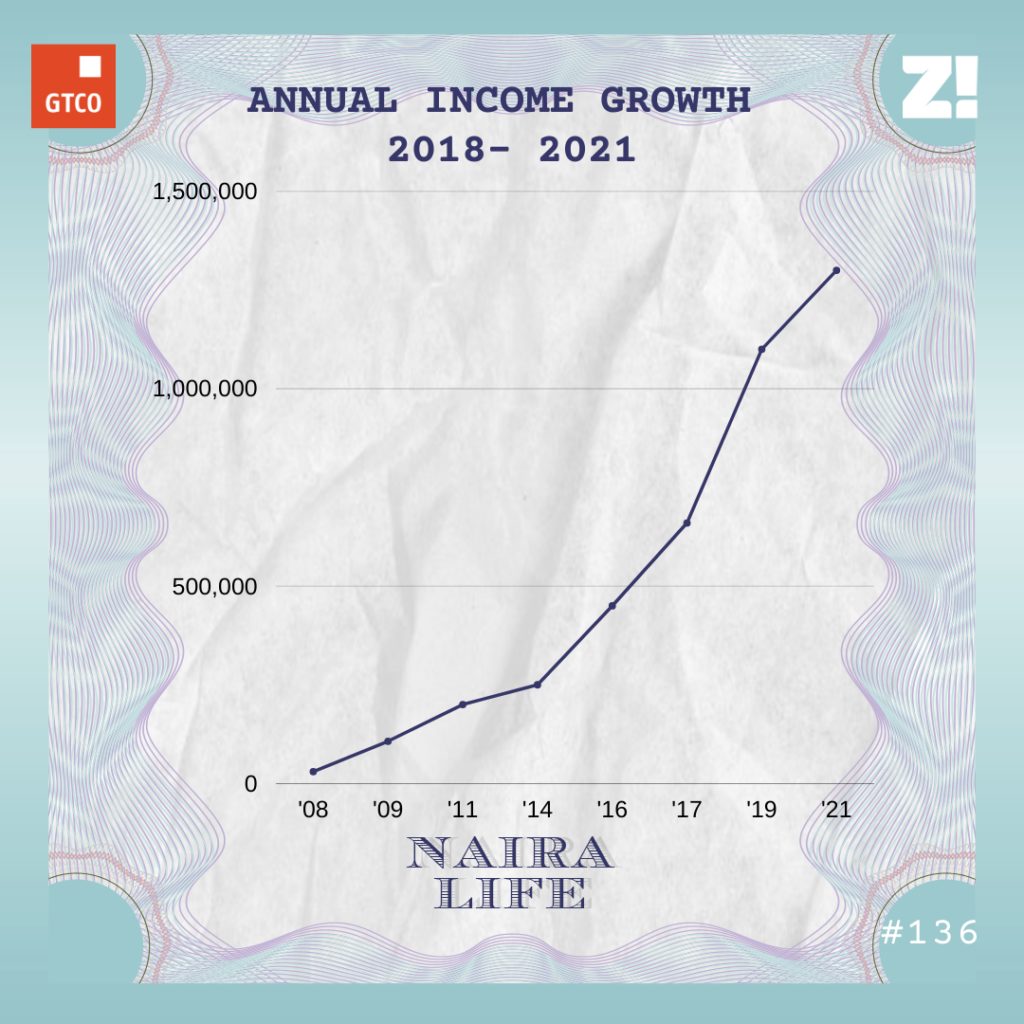
Where did you move to this time?
A telecommunications company. When I saw the job advert, I thought it might be a refreshing change for me. I applied, and I was hired as a manager in their risk and compliance department. I accepted their offer and my monthly salary grew from ₦660k to ₦1.1m. Between the time I started working there and now, I’ve gotten a few raises which has increased my monthly gross salary to ₦1.8m and my net salary to ₦1.3m. This doesn’t include the bonuses and other benefits. With benefits and bonuses, the number rises to about ₦30m per year.
Bonuses: ~₦4m
13th-month salary: ₦1.2m
Leave allowance: ₦1.3m
HMO: ₦600K
You’ve come a long way in the past 13 years, how do you move money around now?
Well, I’m a family man with three kids now — two of whom have started going to school — so my recurrent expenses have grown over the past five years or so. Let’s start with the monthly running costs, which is ₦400k.
Can we break it down, please?
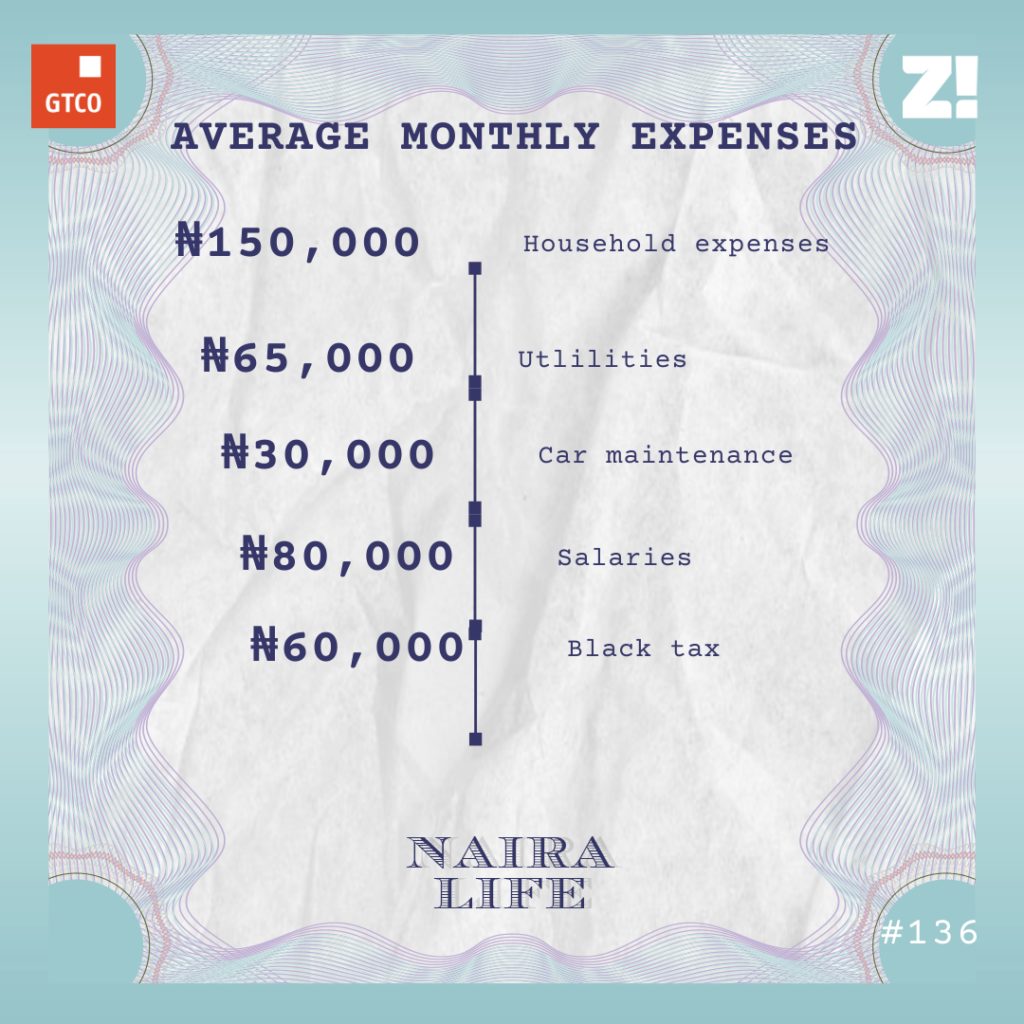
About the salaries: I hired an after-school teacher for my kids, and I pay them ₦20k. There’s also someone who comes in to teach them Arabic and whom I pay ₦20k.
I have two domestic staff on my payroll: a gateman and a lady who helps my wife, and they earn ₦25k and ₦15k respectively.
Got it. Where does the remaining ₦900k go?
I divide it into two parts: ₦400k goes into things like my kids’ school fees and other small projects I’d like to take care of. The remaining ₦500k is for my savings and investments. Thankfully, I don’t pay rent anymore. I completed my building project last year. Do you want me to talk about it?
Yes, please.
I started saving for it in 2015, but I didn’t really act on it until 2018 when I bought a plot of land, which cost ₦550k. But I didn’t like the area it was in. Then I started having ownership issues, so I sold the land for ₦900k.
I had been putting the money I was saving towards the project in my mutual funds account and by 2018, it had accumulated to ₦8m. Later that year, I bought a half plot of land in another part of the city for ₦6m. Now, I had ₦2.9m to start the project — a four-bedroom duplex. Between the time I laid the foundation and the time we moved in, I’d spent more than ₦30m.
Whoa. Let’s break it down.
I’m still not sure how I did it, but let’s attempt to break it down.
I laid the foundation in March 2019, and the first phase of the project gulped about ₦5m. That bit was easy because I’d raised about ₦8m, thanks to my savings and a huge bonus I got at work. After we raised the building to the lintel level, I took a three months break to raise more money. In August 2019, I returned to the project and spent about ₦7.8m to raise it to the decking and roof level, then took another six months break.
I went back to it in February 2020. A month later, Covid struck, so it was suspended for a while. But I really wanted to complete it last year, so I asked the contractor to give me an estimate of how much I’d need to finish the house. The number they gave me was ₦15m, which I didn’t have.
How did you eventually raise it?
I approached my bank for a ₦10m loan, and they approved it. I gathered every other resource I could find to raise the remaining ₦5m. My wife and I agreed to cut down on non-essential expenses, so we could save more. I even sold one of my cars to hit the ₦5m target. Inflation affected the price of things, and I had to borrow an extra ₦2.9m from close associates to pump into the site. That was mostly it.
It took a bit of work and perseverance but we moved into our home in August last year.
Yay! Well done.
Thank you. Now, I have a bank loan to repay. The tenure is for four years, but I’m not a big fan of taking loans unless I absolutely have to. So I’ve been paying it off as fast as I can. I got a bonus at work at the end of last year and most of it went into servicing the loan. Right now, I still have a balance of ₦5m to pay. The plan is to clear it all by the middle of next year.
Man. You talked about savings and investments earlier. What do they look like at the moment?
It’s mostly investments, really. I also do a bit of mutual funds. The ROI is not as attractive as it was a few years ago anymore, but it’s a low-risk investment. I have about ₦4m in my mutual funds account at the moment, and that’s about it.
So how much do you think you should be earning?
I think my earnings are fair. I try not to live in a bubble, so I know it could be a lot worse. Millions of people in the country are not earning as much, and that puts things in perspective for me. I mean, I want more but I’m also content with what I currently earn.
This is a good place to ask how your experiences have shaped your perspective about money.
First, I believe the value of money is in how you use it. Second, growing your income is mostly about how you decide to take on and leverage opportunities. I grew up with nothing and worked my way up here. I won’t deny that I’ve had a lot of help and support, but I also did the work and knew when it was time to move away from a job. Privilege and luck are great, but they don’t work in isolation.
Is there anything you want but can’t afford?
I’m looking to get Canadian or Australian citizenship for my kids but I don’t want to do it via the migration route — it’s too stressful. Citizenship by investment is more straightforward although it’s more expensive. I’d really like that right now, but I can’t afford it.
Fair. What about something you spent money on recently that improved the quality of your life?
My house. The quality of my life has gone up in many ways since my family moved in. The peace of mind I have now is unbeatable.
That makes sense. How would you rate your financial happiness on a scale of 0-10 then?
7. I have all the things I wanted to have at this age — a family and a home to house them. Also, we can afford to do anything we want, which is a departure from my childhood. Canadian or Australian citizenship will shoot this number to a 9. But even if it doesn’t happen, I’m in a good place already.
Great! You got to the end of this article. Know what’s even better? You can get QuickCredit faster than the time it took you to read this article. With Quickcredit, GTBank customers can get N2million in less than 2 minutes and pay back over 12 months at an interest rate of 1.5%. No forms. No collateral. No hidden charges. Get Your Quick Credit on GTWorld


